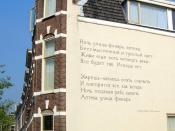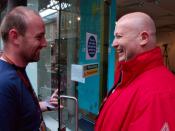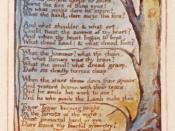"RICHARD CORY" DON'T JUDGE A BOOK BY ITS COVER This poem is nothing more than a sardonic story twisting the axiom that money cannot buy happiness. A very melancholy poem, Richard Cory follows the extreme route to make the point that things are not always, as they seem. The poem starts from the poor workers side of the fence when everyone assumes nicer is happer. However as one reads on the understanding of simplicity's cons are grasped.
From the very beginning of the poem, Richard Cory is presented as an isolated figure. He is not just separated from all others, but alienated as if he were a spectacle, or perhaps a dviene being to be started at and held in awe, the diction associated with Richard cory further emphasizes his distance from the normal world. The word "crown" is used to refer to his head, and his slimness is described as " imperial."
He is obviously thought of as royalty, especially in terms of the worshipful attitude that the poor workers have toward him.
Later the speaker tells that the view of Richard cory held by the common people was not quite accurate. When he says "we thought that he was everything" (11,) we can infer that he is suggesting that they thought wrong. We can also see the foreshadowing of Richard cory fateful ending in line 12 On a "calm summer night," when this wealthy man with no apparent problems in his life and could not have even the weather to blame for depression, " Richard Cory⦠went home and put a bullet through his head" (15-16.) the shock of this final line is partly the consequence of the expectations built up thorough out the poem. Despite that shadowy hint in " we thought," the poem as a whole lures us into viewing Richard Cory in much the same way that the townspeople viewed him by the end of the fourth stanza awe too have succumbed to the mans glamour and are convinced that he is special.
We sympathize and identity with the poor worker, for like him we are merely human and must struggle s against the obstacles of ordinary life. Compared to our suffering, we thing, what problems could a man like Richard Cory possible have? The ironic shock of Richard corys sudden violent suciked forces us to reconsider what we thought we knew about the man we envied, and can only be fully understood by saying the grass is always greener on the other side.






